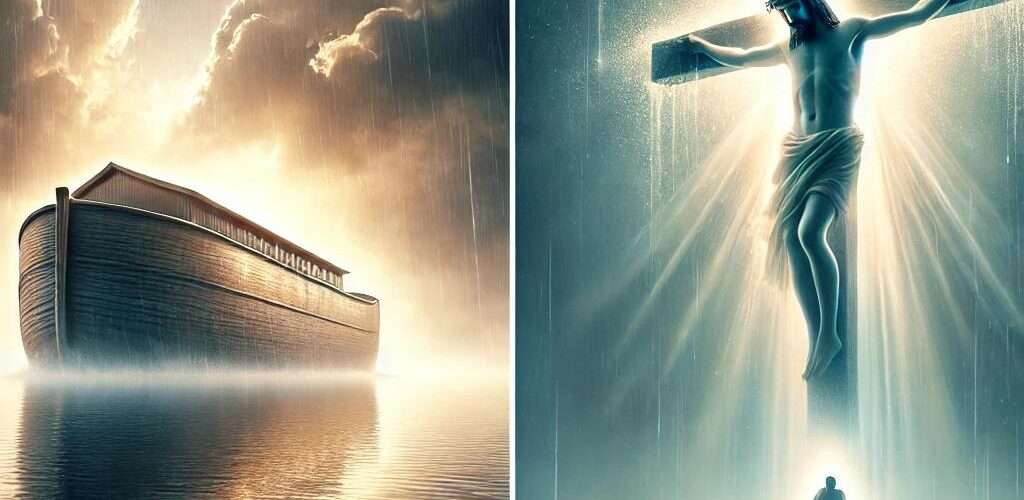Blog
From Noah to the Cross: A Comparison of Responses to God’s Message
- 10/29/2024
- Posted by: Administrator
- Category: King James Bible

From Noah to the Cross: A Comparison of Responses to God’s Message
Throughout history, God has sent messengers to call people to repentance and salvation. In the days of Noah, God warned of judgment and gave the people a chance to escape through Noah’s preaching. Centuries later, Jesus Christ, the Son of God, brought the ultimate message of salvation through the cross. In both cases, we see a common theme: many people rejected the message. This comparison between Noah’s time and the time of Jesus reveals how mankind often responds to God’s call with disbelief and indifference.
1. Noah’s Message: A Call to Repentance
In Genesis 6, the Bible describes the world as filled with wickedness, so much so that “the thoughts of man’s heart was only evil continually” (Genesis 6:5). In response to this widespread sin, God decided to bring a flood to cleanse the earth. He instructed Noah to build an ark and preach repentance to the people.
For over 100 years, Noah faithfully warned people of the coming judgment. Hebrews 11:7 tells us that Noah was “a preacher of righteousness,” calling the people to turn from their wickedness and seek God’s mercy. However, despite his long-standing message, the people scoffed at Noah, mocking the idea of a flood and continuing in their sinful ways (2 Peter 3:3-6). They ignored the warning until it was too late, and when the flood came, only Noah and his family were saved (Genesis 7:7).
2. Jesus’ Message: The Promise of Salvation
Fast forward to the New Testament, and we see Jesus Christ bringing a message of salvation. His message was not just one of warning, but of hope and redemption. Jesus preached repentance, faith in God, and the promise of eternal life through belief in Him (Mark 1:15, John 3:16).
Like Noah, Jesus warned of future judgment. He spoke of the need to turn from sin and trust in Him for salvation (Luke 13:3). He foretold the coming of the Kingdom of God and emphasized the need to be spiritually prepared. However, many people responded to Jesus with skepticism, indifference, and even hostility. Though He performed miracles, healed the sick, and spoke the truth, the religious leaders and many others rejected Him. In John 1:11, it says, “He came unto his own, and his own received him not.”
3. Comparing the Responses: Hardness of Heart
In both Noah’s day and Jesus’ time, there is a common pattern: many people ignored or rejected the call to repentance and salvation. In Noah’s case, the people refused to believe that a flood was coming. They were likely preoccupied with their daily lives and did not want to face the reality of their sin. Jesus described this same attitude in Luke 17:26-27: “And as it was in the days of Noe, so shall it be also in the days of the Son of man. They did eat, they drank, they married wives, they were given in marriage, until the day that Noe entered into the ark, and the flood came, and destroyed them all.”
In the time of Jesus, many people similarly rejected the message of salvation. Though they witnessed His miracles and heard His teachings, they were unwilling to believe that He was the Son of God and that they needed a Savior. They were often blinded by pride, self-righteousness, or simply a desire to continue in their sinful ways. In Matthew 7:13-14, Jesus pointed out that many would choose the broad path that leads to destruction, while few would find the narrow way that leads to life.
4. The Cross: A Final Call
Despite the rejection, God’s offer of salvation through the cross still stands today. Jesus’ sacrifice made a way for all to be saved, but the response remains mixed. Just as in Noah’s time, many people today ignore the message of the gospel. They may dismiss it as irrelevant, mock it, or put off the decision to follow Christ. The world is still filled with distractions, and the temptation to live for the present rather than consider eternity is as strong as ever.
However, there is also hope. Throughout history, there have always been those who have heeded God’s call. In Noah’s time, it was just his family. In Jesus’ time, many disciples and followers believed and were saved. Today, millions around the world have come to faith in Jesus Christ, accepting His gift of eternal life.
The comparison between Noah’s time and the time of Jesus reveals a common truth: while many may reject God’s message, His offer of salvation is always available to those who will believe. The ark was a symbol of salvation in Noah’s day, and the cross stands as the symbol of salvation for all mankind today. The question remains: How will you respond to the message of the cross? Will you, like those in Noah’s day, ignore the warning until it’s too late, or will you place your faith in Jesus Christ and be saved?
At King James Bible College, we encourage everyone to study these truths deeply and reflect on the importance of responding to God’s call. Explore our biblical courses to grow in your understanding and faith.
Leave a Reply Cancel reply
You must be logged in to post a comment.
This site uses Akismet to reduce spam. Learn how your comment data is processed.
